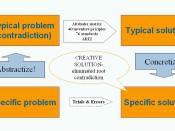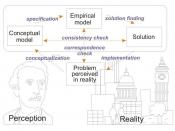Individual differences can have a great impact in a team's ability to solve problems and make decisions. Cooperation in small learning groups is expected to promote active learning because the differing opinions, ideas, suggestions and knowledge of other team members draw each learners' attention to more alternatives and force them more often to make decisions. Cooperation is an essential part of active learning (Slavin, 1997).
Researchers have studied the relationship between personality characteristics and problem-solving strategies (Heppner, Neal, & Larson, 1984; Hopper & Kirschenbaum, 1985; Myers, 1980), with Jung's (1971) theory on psychological type serving as the basis for much of this work, especially as measured by the MBTI (Myers & McCaulley, 1985). It is important to consider the individual differences in problem solving and decision making to adequately understand the dynamics of the team and these processes (Stice, 1987).
Two important considerations in problem solving and decision-making are personality type and temperament.
Research has primarily focused on the relationship of Jung's theory of individuals' preferences and the approach to problem solving and decision- making (Myers & McCaulley, 1985).
Introverts take time to think and clarify their ideas before they begin talking. Extroverts want to talk through their ideas in order to clarify them, sensing individuals will pay attention to facts, details, and reality. They will use selections that worked in the past. Intuition individuals attend to the meaningfulness of the facts, the relationships among the facts, and the possibilities of future events that can be imagined from these facts. They will develop new, original solutions (Huitt, 1992).
Thinkers tend to use logic and analysis during problem solving. They value objectivity and tend to be impersonal in drawing conclusions. They want things to make sense. Feelers are more likely to consider values and feelings. They will be more subjective in...


